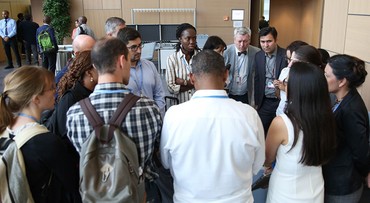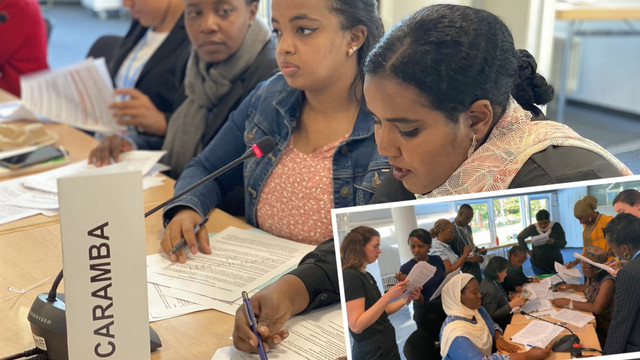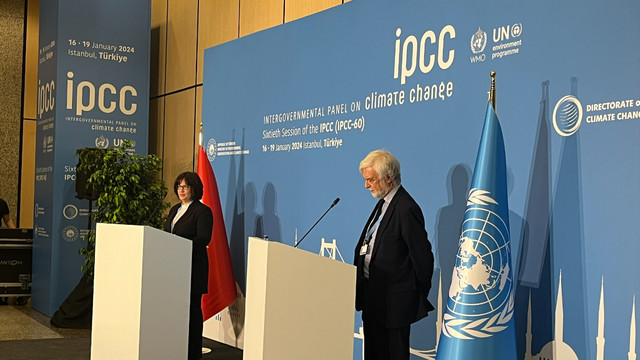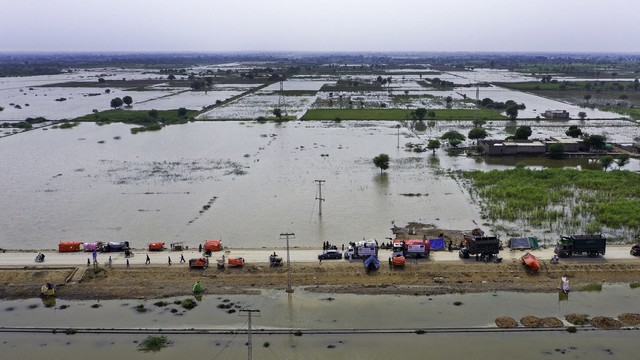On the road to Paris: departing Geneva with expectations high
Progress in Geneva has meant a good start to the climate negotiations on the road to Paris, with elements in the text offering the possibility of a fair deal for developing countries.


A night view of the 193 flags of the UN Member States outside the UN Office in Geneva (Photo: United Nations Photo, CC BY-NC-ND 2.0)
The UN climate negotiations in Geneva concluded successfully with a formal draft negotiating text agreed (PDF) that will serve as the basis for further deliberations in the run-up to the 21st Conference of the Parties in Paris.
Seven key elements in the Geneva text
The Geneva text is a promising start to the most crucial year of the recent history in climate negotiations. It includes many promising options for an ambitious, dynamic and evolving agreement for the future climate regime:
- The Geneva text preserves the option of adopting a protocol – an agreement with the highest legal rigour under international law. This provides a rare opportunity to enhance climate action. According to international environmental law, such protocols have the highest international status of any government undertaking and they must be implemented in good faith, and are binding on parties under international law. They also provide certainty and mutual confidence to parties. They are binding on the state, irrespective of changes of governments or power.
- The Geneva text also allows options for ensuring the highest possible participation in the post 2020 regime. The existing Kyoto Protocol, adopted in 2005, addresses emissions from 38 parties only. The Geneva text includes an option for calling on all parties to enhance their climate action and cooperate on the basis of equity and common but differentiated responsibilities and respective capabilities, acknowledging that the global nature and urgency of climate change calls for the widest possible participation, cooperation and ambitious action by all.
- The current structure of the Geneva text allows all the major elements of the Durban mandate (mitigation, adaptation, finance, capacity building, technology development and transfer, transparency of actions and support) to be considered comprehensively within the Paris agreement, recognising the demands of developing country Parties for a 'balanced text', as all these issues are connected and should be treated holistically within the core of the Paris agreement.
- It calls for the new agreement to be guided by the best available scientific knowledge, including the assessment reports of the Intergovernmental Panel on Climate Change and calls for countries to move towards a sustainable development pathway consistent with carbon neutrality/net zero emissions by 2050. It also includes options to ensure that emission reduction targets in the 2015 agreement are regularly reviewed, with the view of advancing mitigation ambition.
- The text calls for parties to establish a global goal for adaptation. It emphasises that adaptation must be addressed with the same urgency as mitigation and that enhanced action and international cooperation on adaptation is urgently required to enable and support the implementation of adaptation actions aimed at reducing vulnerability and building resilience in developing countries. It calls for further financial and other provisions and for new and more effective institutional arrangements to support developing countries.
- The text includes options for ensuring that there is strong means of implementation such as finance, technology and capacity for developing countries. These options include new, additional and substantial finance to underwrite developing countries' climate actions and mechanisms to regularly review commitments; options for the development and transfer of technologies that support climate change actions in developing countries; and options to build the capacity of the most disadvantaged countries.
- Finally, the text includes options to ensure that the mitigation and financial commitments that the parties make in Paris are transparent and accountable. Some options calls for measures to enhance clarity and comparability between country commitments, to ensure accountability and mutual trust and to promote ambition and progressive enhancement. The provisions related to facilitating implementation and compliance calls for related measures to be expert-based, non-confrontational and non-judicial. It calls for provisions on compliance to be preventative and cooperative.
The 86-page Geneva text reflects many deep and long-standing divisions on various negotiating issues. Further negotiations on these issues are crucial to ensure that the most ambitious options in the draft remain in the final agreement, to be concluded in Paris this December.
Justice for the most vulnerable
Many of the 500 decisions made over the past 20 years of global climate negotiations have failed to effectively address the demands and vulnerabilities of the most vulnerable countries including the Least Developed Countries (LDCs). The climate impacts are rising at an alarming rate, as are the vulnerabilities of these countries.
The next steps must involve parties agreeing on ways in which they can address the needs and demands of the most vulnerable. 2015 is an opportunity for collective efforts to recognise that the livelihoods of people in the most vulnerable countries depend on an ambitious outcome, one at the scale of the challenge that they are currently facing.
There is significant evidence that the world's most vulnerable countries are facing severe loss and damage due to climate impacts. In the current negotiations, the most vulnerable countries remain resolute in the view that loss and damage is distinct from adaptation and therefore request the two issues be treated as separate and distinct discussions.
Loss and damage is a crucial issue for us. It's an issue beyond adaptation hence need to be treated separately. LDC lead negotiator #ADP2015
— Achala Chandani (@AchalaC) February 9, 2015
In the current text, however, loss and damage is not separated from adaptation and is not in a stand-alone section. At the next negotiating session, parties must discuss and agree on how both the structure and content related to loss and damage issues will be addressed within the context of Paris agreement.
Crucial steps beyond Geneva
There are many challenges ahead. The most significant is the need to condense the negotiating text while preserving global ambition for the most effective post 2020 regime. Without doubt, each party will endeavour to protect their stated positions in the draft text.
This will result in tense and extensive negotiations. However, if the Paris COP is to be a success, parties will have to make compromises and carefully balance each other's priorities.
National contributions
It is also critically important that all parties come forward with ambitious national action plans in the form of their Intended Nationally Determined Contributions (INDCs) (PFD). The first set of these contributions are due to be presented by governments by the end of March.
Parties must also comply with their existing commitments, including ratifying the second commitment period, and delivering on promises for finance. All these activities will undoubtedly further enable trust in the 2020 regime.
The purpose of the current exercise is to further enhance full, effective and sustained implementation of the UN climate change convention from 2020 through a strengthened multilateral rules-based regime. Geneva delivered on its mandate.
The next steps on the road to Paris are equally important and must be productive and ambitious if the 2015 agreement to be a success. The onus is on all parties to deliver.
Achala Abeysinghe (achala.abeysinghe@iied.org) is the principal researcher and team leader of the global climate law, policy and governance team in IIED's Climate Change Group.
Background: Before the talks in Geneva, Abeysinghe set out the crucial work required of governments in order to reach a global agreement in Paris.




